Book contents
- Frontmatter
- Contents
- Preface
- 1 Introduction
- 2 Starting out in research
- 3 Getting down to research
- 4 Scientific ethics and conduct
- 5 Publish or perish?
- 6 Communication and getting known
- 7 Moving up
- 8 Responsibilities
- 9 Funding research
- 10 Who owns science?
- 11 Science and the public
- 12 Power, pressure and politics
- 13 Social aspects of science
- 14 So who does want to be a scientist?
- Index
4 - Scientific ethics and conduct
Published online by Cambridge University Press: 06 July 2010
- Frontmatter
- Contents
- Preface
- 1 Introduction
- 2 Starting out in research
- 3 Getting down to research
- 4 Scientific ethics and conduct
- 5 Publish or perish?
- 6 Communication and getting known
- 7 Moving up
- 8 Responsibilities
- 9 Funding research
- 10 Who owns science?
- 11 Science and the public
- 12 Power, pressure and politics
- 13 Social aspects of science
- 14 So who does want to be a scientist?
- Index
Summary
A scientist who habitually deceives himself is well on the way toward deceiving others.
Philosophically, scientific research is about discovering the truth, so dishonesty should have no place. However, scientists are normal people with the same faults and failings as anyone else, with inhibitions and fears, and, in spite of the lofty morals of science, some do behave badly, committing acts of dishonesty. Many more would consider themselves basically honest, but good intentions do not always ensure ethical behaviour.
The responsibilities of scientists are far reaching. You have responsibilities to colleagues and the scientific community, your employer and funder, and of course to society. Unfortunately, the limits of ethical behaviour and good conduct are not always obvious. Only rarely is the young scientist handed a set of rules and regulations as they begin to train in research. They will (or should) be aware of general moral and legal issues, and things they should not do, such as steal goods, harm people or lie about what they have done. But scientific conduct is rather more complex than that. Whereas it may be acceptable in some professions to be ‘economical with the truth’ (i.e. to simply leave something out or unsaid if it benefits your cause), this is not so in science.
The number of cases of overt misconduct (which is proven) seems to be relatively small, but growing. The apparent growth may be simply that there is now more awareness, investigation and publicity about such cases.
- Type
- Chapter
- Information
- Who Wants to be a Scientist?Choosing Science as a Career, pp. 29 - 38Publisher: Cambridge University PressPrint publication year: 2002



